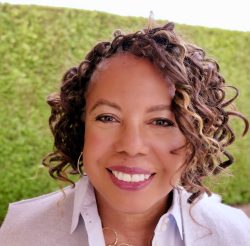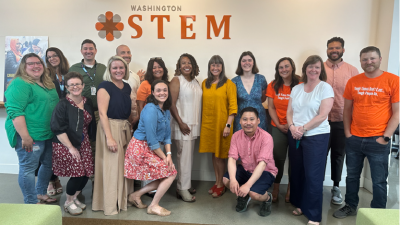Meet Lynne K. Varner, CEO of Washington STEM

Why did you decide to join Washington STEM?
I’ve spent most of my career advocating for disadvantaged communities, and I’ve done that in a number of ways. One was journalism, where I used the strength and power of the pen to advocate for change. I see Washington STEM as an extension of that kind of advocacy because it’s about pointing out systems and challenges that prevent people from accessing the opportunities. Sometimes we’ve got to create opportunities, other times it’s really just a matter of removing barriers so students can take dual credit classes like AP, so that they can learn more about the amazing world of STEM. I feel as though Washington STEM is a place where I’m going to get to dismantle some systems, reshape others, but most of all, just continue that advocacy work that I’ve been doing all this time.
“Choice is nothing without the means and ability to realize it.”
What do equity in STEM education and career mean to you?
At its most basic, equity means not only does every student have an opportunity and choice—’I can study any career I want’—but equity means I’m given the tools to make that choice. Anyone can take an honors class in high school—but not if they had a substandard elementary education. So we are putting ‘teeth’ behind equity.

Why did you choose your career?
I’m a lifelong writer. I’ve been writing news stories—first for fun in elementary school—then for school newspapers in college. That is how I speak—through the written world. But knowledge is power, and I want to give people knowledge and information that empowers them so they can make decisions in their own best interests. What I like about Washington STEM is we tackle the systems and structures that allow people to advance and have access and opportunity. I moved into higher education because education is the key to economic stability, an empowered life, and stable communities—education flows through all of that. And it’s not just for jobs—it’s about the civics aspect which support a strong neighborhood and empathetic society.
“What I like about Washington STEM is we tackle the systems and structures that allow people to advance and have access and opportunity.”
Can you tell us more about your education and career path?
In high school I was pushed into a secretarial course. I was a good student—and a good writer, according to my English teacher. But my teachers probably thought, ‘she comes from single-parent family, she probably can’t afford it, she’s never talked about college, so we’ll focus on kids who are college-bound’. What’s disappointing about that is that those kids tended to be well-off and white.
But my life has shown that to not bet on me is a big mistake. By my senior year of high school, I had never thought about college. But one day I overheard some cheerleaders talking about the SATs—one was African American. I asked, “What’s that?” They said, “It’s too late, it’s this Saturday.” I immediately went to the office to sign up. Luckily, I didn’t know there was SAT prep—I probably would have self-selected out. But I did well enough that I got into the University of Maryland, and received considerable financial aid. That set me on the higher education track, and I had the opportunity to figure out what I wanted to do in the future.
“…my teachers probably thought “she comes from single family, she probably can’t afford it, she’s never talked about college, so we’ll focus on kids who are “college bound”. What’s disappointing about that is that those kids tended to be well-off and white.”
Since then, I have sought out opportunities to always be in a classroom—I’ve held fellowships at Stanford, Columbia University, and the Poynter Institute in Florida, a training ground for journalism. These credentials represent my thirst for learning—not just that I’m job-ready, but that I’m curious.
What inspires you?
I once went to a Beyoncé concert with two young Black women from Garfield High School who wanted to start a newspaper. They would have gotten help if they were part of an establishment— part of their school paper, or backed by the PTA—but they weren’t, and this is a result of structural racism. So, I helped them get funds from The Seattle PI and I worked with them for 4 years. We keep in touch—one lives in LA and works in film and tv, the other is a local entrepreneur. Working with them really inspired me because it allowed me to see the impact.
What are some of your favorite things about Washington state?
This is the most green, verdant, lush state ever. I’m out back right now and it sounds like a jungle—it’s not unusual to see a racoon or coyote walking by. Also, I like that the style is more relaxed. I’m from the East Coast and when I came out here, I realized my hair doesn’t need to be quaffed every day. And the first time I went to the opera and saw somebody wearing jeans, I was like, ‘They’re going to ask him to leave,’ but nope! We don’t do that out here. It’s ok to be an individual—this place is full of them! I feel that Washington state is a place that really accepts people.
What is one thing about you that people can’t find on the internet?
I love to bake and cook—not commercially or to entertain, but to eat. I’d love to travel and take cooking classes in other countries, so I can learn about spices. When I was at Washington State University (WSU), I visited this vault called the Bread Lab at the WSU Mount Vernon Research Center where they store grain—some from the 1500s. Imagine growing grains for the same kind of bread baked by Trappist monks! I love that food comes full circle—we grow the same things that people grew centuries ago.